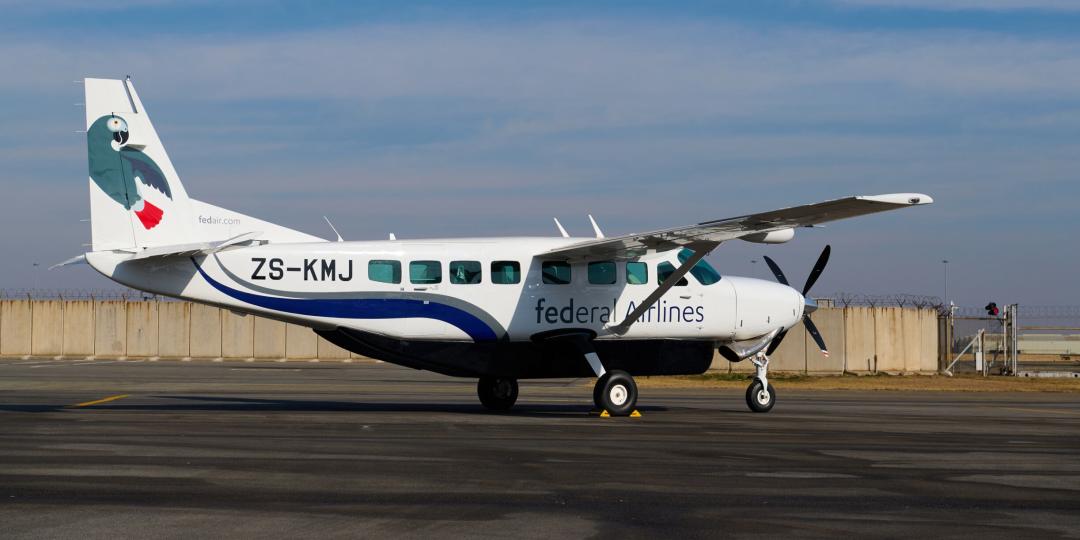Federal Airlines (FedAir) – a leader in air travel to key safari and game reserve destinations in the country – announced its major aircraft fleet expansion this week.
The airline has introduced six new Cessna Grand Caravan C208B EX aircraft that “sets a new standard in passenger comfort, reliability and safari travel experience”.
The new fleet will improve the travel experience for FedAir guests travelling to and from the various luxury safari lodges across the country and from key tourism gateways in the country.
The new C208B EX aircraft is known for its dependable and efficient performance and is currently operated by several worldwide regional airlines, safari and charter operators and cargo carriers.
The new aircraft acquisition means that FedAir now currently operates a combined fleet of 12 Cessna Caravan C208Bs, one Beechcraft B1900D, and two Pilatus PC12 aircraft, as well as two Embraer ERJ145 50-seat aircraft.
Key features of the Cessna Caravan C208B EX include:
- Advanced operating features: The new aircraft comes with cutting-edge flight avionics and control systems, with enhanced graphics, split-screen capability, faster hardware and various other additional new features.
- Ultra-efficient Pratt & Whitney PT6A-140 engines: The new aircraft are equipped with a more powerful and fuel-efficient engine, providing improved cruising speeds, payload and range.
- Enhanced passenger comfort: Redefined interiors and comfortable seating allow a new level comfort.
- Options for cabin interiors and configurations: Multiple configurable interiors provide flexibility and enhanced comfort for shuttle and charter customers; offering VIP interiors with seating for eight passengers and up to a 12-seater standard seating commuter option. It can be configured as either an eight-seater aircraft (eight single seats), or a ten-seater (eight singles and a double), or 12-seater (four doubles and four singles).
FedAir CEO, Mark Hurst, said: "This new fleet of six C208B EX aircraft represents a R350m (€17.7m) investment into our business and the country’s exclusive safari tourism industry. The fleet will provide at least ten years of safe, reliable and enhanced air travel for our guests and customers.
“We are proud to be at the forefront of the tourism travel industry, delivering air connectivity and exclusive shuttle and charter services whilst continuously striving to improve the overall travel experience for our guests and international travellers visiting South Africa from all corners of the globe.”
FedAir Group Chairman, Rashid Wally, commented: “The Caravan C208B EX embodies our commitment to sustainability, passenger comfort, and overall safety. The new aircraft will enable us to continue to offer our customers the highest levels of service and reliability, and we are grateful and encouraged by the continued support of our loyal industry partners and clients.”
‘Keep on growing tourism in SA’
Hurst told Tourism Update that the fleet would be mainly deployed in South Africa, with its main operating facility in Johannesburg (OR Tambo International Airport), as well as one at Kruger Mpumalanga International Airport in Mbombela.
“A lot of the travel will be from point-to-point into the actual game lodges. Travellers land on a runway right next to the lodge they want to go to. It ensures a much safer environment for our guests.”
He said South Africa as a tourist destination was a big value product, and that the airline viewed itself as an enabler of tourism in South Africa.
“International tourists arriving in the country find local travel affordable, and South Africa is normally the first point of entry for them when travelling to Africa. Some of the top game lodges in the world are in South Africa and we see this purchase as a massive opportunity to keep on growing tourism in the country. We are also removing the logistics barrier for tourists who want to save time on their trips by not travelling in cars and ensuring a safe arrival.”
Wally added that the new aircraft allowed families or friends to all travel on the same aircraft.
In terms of future plans, Hurst pointed out that the airline had a mechanical programme where it brought inexperienced engineers and trained them on the engineering side of the aircraft, and that it was planning to extend a similar programme to crewing as well.























